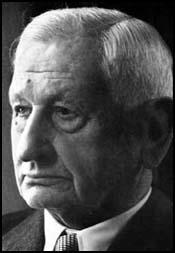Friedrich Flick

Friedrich Flick was born in in Ernsdorf, Germany on 10th July, 1883. He entered the iron industry and by the early 1930s was a director of United Steel Works, the largest steel-producing firm in Germany.
In 1933 Flick became a leading financial supporter of the National Socialist German Workers Party (NSDAP) and over the next ten years donated over seven million marks to the party. A close friend of Heinrich Himmler, Flick also gave the Schutz Staffeinel (SS) 10,000 marks a year.
During the Second World War Flick became extremely wealthy by using 48,000 slave labourers from Germany's concentration camps in his various industrial enterprises. It is estimated that 80 per cent of these workers died as a result of the way they were treated during the war. Flick was found guilty of war crimes at Nuremberg in 1947 and was sentenced to seven years in prison.
By 1950 the United States was involved in fighting the Cold War. In June of that year, North Korean troops invaded South Korea. It was believed that German steel was needed for armaments for the Korean War and in October, John J. McCloy, the high commissioner in American occupied Germany, lifted the 11 million ton limitation on German steel production. McCloy also began pardoning German industrialists who had been convicted at Nuremberg. This included Fritz Ter Meer, the senior executive of I. G. Farben, the company that produced Zyklon B poison for the gas chambers. He was also Hitler's Commissioner of for Armament and War Production for the chemical industry during the war.
McCloy was also concerned about the increasing power of the left-wing, anti-rearmament, Social Democratic Party (SDP). The popularity of the conservative government led by Konrad Adenauer was in decline and a public opinion poll in 1950 showed it only had 24% of the vote, while support for the SDP had risen to 40%. On 5th December, 1950, Adenauer wrote McCloy a letter urging clemency for Krupp. Hermann Abs, one of Hitler's personal bankers, who surprisingly was never tried as a war criminal at Nuremberg, also began campaigning for the release of German industrialists in prison.
In January, 1951, John J. McCloy announced that Alfried Krupp and eight members of his board of directors who had been convicted with him, were to be released. His property, valued at around 45 million, and his numerous companies were also restored to him. Flick was also released.
McCloy's decision was very controversial. Eleanor Roosevelt wrote to McCloy to ask: "Why are we freeing so many Nazis? The Washington Post published a Herb Block cartoon depicting a smiling McCloy opening Krupp's cell door, while in the background Joseph Stalin is shown taking a photograph of the event. Telford Taylor, who took part in the prosecution of the Nazi war criminals wrote: "Wittingly or not, Mr. McCloy has dealt a blow to the principles of international law and concepts of humanity for which we fought the war."
Rumours began circulating that McCloy had been bribed by the Krupp's American lawyer, Earl J. Carroll. According to one magazine: "The terms of Carroll's employment were simple. He was to get Krupp out of prison and get his property restored. The fee was to be 5 per cent of everything he could recover. Carroll got Krupp out and his fortune returned, receiving for his five-year job a fee of, roughly, $25 million."
McCloy rejected these claims and told the journalist, William Manchester: "There's not a goddamn word of truth in the charge that Krupp's release was inspired by the outbreak of the Korean War. No lawyer told me what to do, and it wasn't political. It was a matter of my conscience."
By 1955 Flick owned over 100 companies with an annual turnover of two billion dollars. Flick was reported to be the richest man in Germany and the fifth-richest man in the world. However, he refused to pay any compensation to the families of the people who had died making him wealthy.
Friedrich Flick died at Konstanz on 20th July, 1972. He left over a billion dollars to his playboy son but nothing to the families of the 48,000 people who had died while slave labourers during the Second World War.
